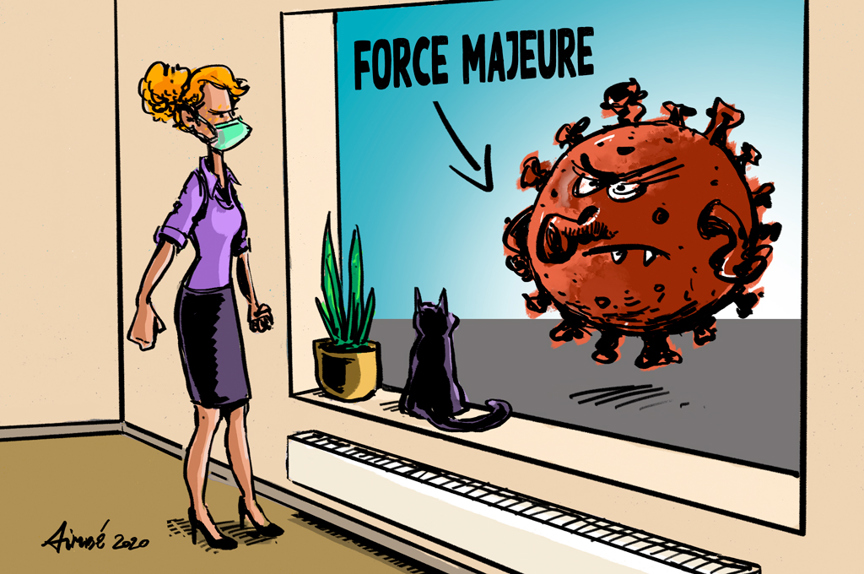- Real Estate, Renting and Co-ownership
- pandemic closure , corona crisis , commercial properties , conona measures , landlord , tenant , force majeure provision , article 1722 OCC , reduce the price , claim termination of the lease , rented commercial premises , legal destruction of the property. , leased proprerty , rent
The corona crisis has had a major impact on many people, especially financially. Both tenants and landlords of commercial properties had to endure the corona measures.
Landlords were frequently asked by their tenants to waive the rent due during periods of mandatory closures. To this end, tenants sometimes invoked the force majeure provision of the Old Civil Code (hereinafter OCC) on rent.
In this short article, we consider the position taken by the Belgian Supreme Court in this context.

1. What stipulates article 1722 of the Old Civil Code?
This article stipulates that: "If the leased property has been completely destroyed by accident during the lease period, the lease is terminated by operation of law; if the property has been only partially destroyed, the tenant may, depending on the circumstances, either reduce the price or even claim termination of the lease. In neither case shall compensation be payable."
This article applies actually the general legal doctrine on of force majeure or the risk. This means that when one party cannot perform its obligation due to force majeure, the other party is also released from the performance of its obligation.
It is important to note that this article can be applied even if neither the tenant nor the landlord are liable for not being able to perform their respective obligations. It is precisely for circumstances of force majeure, where in principle no one is to be blamed or situations that no one could have foreseen or prevented, that this article exists. In such situations, article 1722 OCC ensures that either a rescission or a price reduction can take place when the tenant has not been able to exercise the enjoyment of the rented property.
The article refers to the "destruction" of the property. This means not only the physical destruction, but also the legal destruction of the property. In other words, the property may still exist physically, but the landlord is unable to provide the tenant with the agreed enjoyment and use. The corona measures are the perfect example of this: commercial properties had to close temporarily, preventing the landlord from providing the tenant with the enjoyment of the property.
The question is whether this temporary closure can be considered force majeure under article 1722 OCC.
2. Case law and position of the Supreme Court
Given the difficult situations caused by the pandemic and the many lockdowns that were ordered, it was only a matter of time before our judges would have to rule on this article because of the corona measures.
These cases have since found their way to the Belgian Supreme Court. Indeed, the latter has recently ruled in several judgments on the application of article 1722 OCC with regard to corona measures and the consequences.
In its judgment of 26 May 2023, the Supreme Court ruled that the temporary nature of the enjoyment impairment because of the corona measures does not preclude the application of article 1722 OCC. In this decision, the Court stated that "when the accessibility to the public of the rented commercial premises is no longer possible in whole or in part due to government measures to combat the corona pandemic" such circumstances constitute a force majeure situation to which article 1722 OCC applies.
In a subsequent judgment of 7 September 2023, the Court ruled that the fact that the temporary disturbance of enjoyment because of the corona measures was not imputable to the landlord did not preclude that article 1722 OCC applies.
Surely, the Supreme Court has now confirmed in several decisions that this article can be applied in respect of the corona measures. Both decisions were made in respect of the first lockdown that took effect in March 2020.
The Supreme Court clearly held that the corona measures should be considered as the legal destruction of the property. Since the landlord could not provide the enjoyment of the property during this period, the tenant's obligation to pay the rent also lapsed. Neither the temporary nature nor the fact that it was not imputable to the landlord stood in the way of the application of article 1722 OCC, according to the Supreme Court.
3. The risk shifts to the landlord
The effect of this case law is that the risk with regard to the corona measures shifts entirely to the landlord and that he is the one who has to bear the burden as a result.
In the end, it is the landlord who loses out on rental income for the months in which a mandatory closure was imposed as a result of the corona measures. This is because, according to the court, the landlord could not provide enjoyment of the property.
4. How can this risk be covered?
Article 1722 OCC is not mandatory and it is therefore perfectly possible to exclude this risk contractually. Landlords can exclude the application of this article in cases of mandatory closures by the government or they can limit reductions of the rent to e.g. 50%. In this way, the risk is not exclusively borne by the landlord and there is also compensation by the tenant.
We therefore strongly advise to have your contracts regularly reviewed by professionals. You can always call on the specialists at Seeds of Law. Do not hesitate to contact us via info@seeds.law or +32 (0)2 747 40 07.







